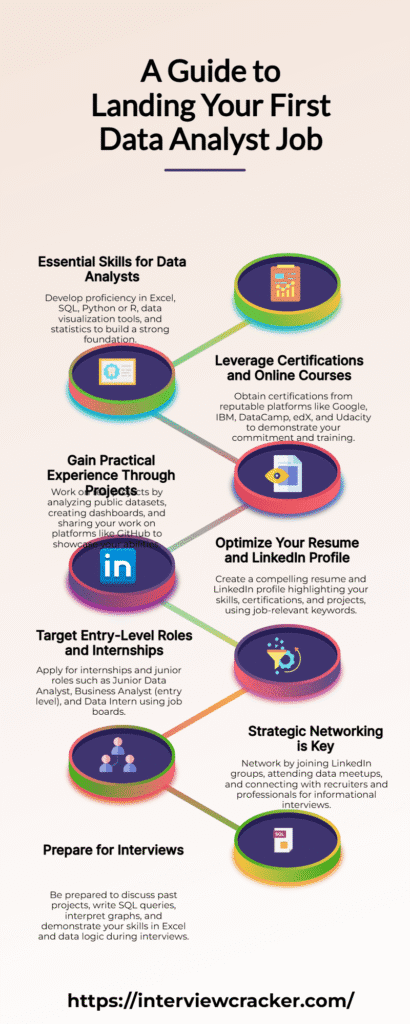An entry level data analyst is often the starting point for one of today’s most in-demand and rewarding career paths. With businesses relying heavily on data-driven decisions, entry level data analysts play a crucial role in turning raw numbers into meaningful insights. This role is ideal for individuals with strong analytical thinking, a passion for solving problems, and an eagerness to contribute to real-world outcomes from day one.
In this blog, we’ll break down the responsibilities, must-have skills, and global salary trends for entry level data analyst roles in 2025.
Table of Contents
ToggleWho Is a Data Analyst?
A data analyst is a professional responsible for collecting, organizing, and analyzing data to help businesses make informed decisions. They transform raw data into meaningful insights, uncover trends, and solve complex business problems.
Job Description of a Data Analyst
Key Responsibilities
Data Collection and Management
- Gather data from various sources like databases, surveys, and web analytics tools.
- Organize and maintain data in structured formats for analysis.
Data Analysis
- Use statistical techniques and software to analyze data sets.
- Identify patterns, trends, and correlations within the data.
Reporting and Visualization
- Create clear, actionable reports using tools like Excel, Tableau, or Power BI.
- Present insights to stakeholders through graphs, charts, and dashboards.
Problem-Solving
- Collaborate with teams to understand business challenges.
- Recommend strategies based on data insights to drive growth or improve efficiency.
Compliance and Accuracy
- Ensure data privacy and accuracy.
- Adhere to regulatory and ethical standards while handling data.

Salary of a Data Analyst
The salary of a data analyst varies based on factors like experience, industry, location, and the organization’s size.
1. Entry-Level Data Analyst
- USA: $50,000 – $70,000 per year
- India: ₹3,50,000 – ₹6,00,000 per year
- UK: £22,000 – £30,000 per year
- Canada: CAD 45,000 – CAD 65,000 per year
- Australia: AUD 55,000 – AUD 75,000 per year
2. Mid-Level Data Analyst
- USA: $75,000 – $100,000 per year
- India: ₹7,00,000 – ₹12,00,000 per year
- UK: £35,000 – £50,000 per year
- Canada: CAD 70,000 – CAD 90,000 per year
- Australia: AUD 85,000 – AUD 110,000 per year
3. Senior Data Analyst
- USA: $100,000 – $130,000 per year
- India: ₹15,00,000+ per year
- UK: £60,000+ per year
- Canada: CAD 100,000+ per year
- Australia: AUD 120,000+ per year
Factors Influencing Salaries
- Experience: Professionals with advanced skills and certifications earn more.
- Industry: High-demand industries like finance, healthcare, and technology offer better pay.
- Location: Salaries tend to be higher in urban and tech-centric regions.
Skills Required for Entry Level Data Analyst Jobs
1. Technical Skills
- Proficiency in Tools and Software: Excel, SQL, Python, R, and data visualization tools like Tableau or Power BI.
- Data Handling: Knowledge of databases and data warehousing.
- Statistical Analysis: Understanding statistical methods and predictive modeling.
2. Soft Skills
- Strong analytical thinking and problem-solving abilities.
- Effective communication to present findings to non-technical audiences.
- Attention to detail and organizational skills.
Entry Level Data Analyst Requirements
Here are the common entry-level data analyst requirements employers typically look for:
1. Educational Background
Bachelor’s degree in a relevant field such as:
Data Science
Statistics
Mathematics
Computer Science
Economics
Business or Finance
(Some roles may accept candidates from non-technical backgrounds with strong analytical skills or certifications.)
2. Technical Skills
Excel (advanced functions, pivot tables, charts)
SQL (to extract and query data from databases)
Data Visualization Tools (Tableau, Power BI, or Google Data Studio)
Programming Languages (basic knowledge of Python or R is a plus)
Data Cleaning and Analysis techniques
3. Analytical & Problem-Solving Skills
Ability to interpret data patterns and trends
Strong attention to detail
Logical thinking and curiosity to explore “why” behind the numbers
4. Communication Skills
Ability to present data insights clearly to non-technical stakeholders
Report writing and storytelling with data
5. Certifications (Optional but Helpful)
Google Data Analytics Professional Certificate
IBM Data Analyst Certificate
Microsoft Certified: Data Analyst Associate
Coursera, edX, or Udacity data analyst courses
6. Portfolio or Projects
Practical projects showing data analysis, dashboards, or insights
GitHub repositories or shared links to your work
How to Start a Career as a Data Analyst
1. Educational Background
A bachelor’s degree in fields like data science, computer science, statistics, or mathematics is typically required. Advanced roles may demand a master’s degree or specialized certifications.
2. Learn Technical Skills
Acquire proficiency in tools and programming languages like SQL, Python, R, and Excel. Familiarize yourself with data visualization platforms.
3. Gain Relevant Experience
Start with internships or entry-level roles to build hands-on experience. Work on projects that demonstrate your analytical and problem-solving skills.
4. Obtain Certifications
Certifications like Microsoft Certified Data Analyst Associate, Google Data Analytics Professional Certificate, or Tableau Desktop Specialist can boost your credentials.
Industries Hiring Entry Level Data Analysts
- Technology: Analyzing user data and improving digital platforms.
- Finance: Risk analysis, fraud detection, and portfolio management.
- Healthcare: Optimizing patient care and operational efficiency.
- Retail: Studying consumer behavior and inventory management.
- Marketing: Campaign analysis and audience segmentation.
Why Choose a Career as a Data Analyst in 2025?
- High Demand: Businesses increasingly rely on data to make decisions, ensuring steady demand for skilled professionals.
- Lucrative Salaries: Competitive pay across all experience levels.
- Versatile Applications: Opportunities in diverse industries.
- Career Growth: Pathways to advanced roles like Data Scientist, Business Analyst, or Data Engineer.
How to Get Entry Level Job as Data Analyst?

Getting an entry-level job as a data analyst requires a mix of foundational skills, smart preparation, and strategic job searching. Here’s a step-by-step guide to help you break into the field:
✅ 1. Build the Right Skills
Excel – Master pivot tables, formulas, and charts.
SQL – Learn to query databases and manipulate data.
Python or R – Focus on basic data analysis, Pandas, and visualization libraries.
Data Visualization – Learn tools like Tableau, Power BI, or Google Data Studio.
Statistics & Analytical Thinking – Understand key concepts like correlation, regression, and A/B testing.
✅ 2. Take a Certification or Online Course
Courses from:
Google Data Analytics Professional Certificate (Coursera)
IBM Data Analyst Certificate (Coursera)
DataCamp, edX, or Udacity bootcamps
These show employers that you’re serious and have real training.
✅ 3. Work on Real Projects
Analyze public datasets (Kaggle, Data.gov, etc.)
Create dashboards and reports
Share your work on GitHub or a personal portfolio website
✅ 4. Create a Data Analyst Resume and LinkedIn Profile
Highlight your skills, certifications, and projects
Use job-relevant keywords like “data visualization,” “SQL queries,” and “data cleaning”
✅ 5. Apply to Internships and Junior Roles
Look for roles like:
Junior Data Analyst
Business Analyst (entry level)
Data Intern
Reporting Analyst
Use job boards like LinkedIn, Indeed, and Glassdoor.
✅ 6. Network Smartly
Join LinkedIn groups or attend data meetups
Follow recruiters and hiring managers in analytics
Reach out to alumni or professionals for informational interviews
✅ 7. Prepare for Interviews
Be ready to:
Explain past projects
Write basic SQL queries
Interpret graphs or business cases
Demonstrate Excel and data logic
Pro Tip:
Even if you’re coming from a non-tech background, showing curiosity, completed projects, and problem-solving skills can land you your first job.
Conclusion
A career as a data analyst offers a perfect balance of challenge, growth, and reward. With the right skills and dedication, you can help businesses unlock the true potential of data. Whether you’re a recent graduate or looking to transition into the field, the opportunities in this profession are immense.
Start your journey today, and become the driving force behind data-powered decision-making.
FAQs on Entry-Level Data Analyst Jobs in 2025
What does an entry-level data analyst do?
Entry-level data analysts collect, clean, and organize data for analysis. They create reports, identify trends, and provide insights to support business decisions under the guidance of senior analysts.
What skills are required for entry-level data analyst jobs?
Key skills include:
- Proficiency in Excel, SQL, and basic programming (Python or R).
- Familiarity with data visualization tools like Tableau or Power BI.
- Strong analytical and problem-solving abilities.
Do I need a degree to apply for an entry-level data analyst job?
While a degree in data science, computer science, or a related field is often preferred, candidates with certifications and relevant skills can also secure entry-level positions.
Can I start Data Analyst with No Experience?
Yes, you can start a data analyst career with no experience—many professionals begin by building foundational skills through online courses, certifications, and personal projects. Focus on learning tools like Excel, SQL, and Python, and showcase your abilities through real-world datasets, portfolios, or internship opportunities. Entry-level roles are designed for beginners, so strong analytical thinking, a willingness to learn, and demonstrated skills can help you break in, even without formal job experience.
Why should I hire a mid-level data analyst instead of a junior one?
Hiring a mid-level data analyst brings more experience, technical proficiency, and business insight compared to a junior analyst. They often require less training and can handle complex data tasks independently, saving your company time and resources.
What qualifications should I look for when I hire a mid-level data analyst?
When you hire a mid-level data analyst, look for candidates with at least 2–5 years of experience, strong proficiency in tools like SQL, Excel, Python or R, and a proven track record of translating data into actionable insights for business growth.
How much does it cost to hire a mid-level data analyst?
The cost to hire a mid-level data analyst varies by region and industry, but average annual salaries range from $65,000 to $95,000 in the US. Freelance or contract-based analysts may charge hourly rates between $40 and $80.
What tools should I learn to become a data analyst in 2025?
Essential tools include:
- Microsoft Excel and SQL for data manipulation.
- Python or R for advanced analytics.
- Tableau, Power BI, or Looker for data visualization.
Are certifications necessary for entry-level data analyst jobs?
Certifications aren’t mandatory, but can enhance your profile. Popular options include Google Data Analytics Certificate, Microsoft Certified Data Analyst Associate, and Tableau Desktop Specialist. Check Google’s Free Data Analytics Course with Certification
How can I gain experience for an entry-level data analyst role?
Start with internships, personal projects, or freelance work. Platforms like Kaggle offer opportunities to practice and showcase your skills.
Are entry-level data analysts in demand in 2025?
Yes, with businesses increasingly adopting data-driven strategies, the demand for data analysts, including entry-level roles, is at an all-time high.
Can entry-level data analysts work remotely?
Many companies offer remote or hybrid roles for data analysts, making it a flexible career option, especially in the post-pandemic era.
What are the career growth opportunities for data analysts?
Entry-level data analysts can progress to roles like senior data analyst, business analyst, data scientist, or data engineer with experience and additional skills.
How can I prepare for an entry-level data analyst interview?
Focus on:
- Learning commonly used tools and techniques.
- Reviewing basic statistics and SQL queries.
- Practicing problem-solving and case study question.








Hi
Very useful and informative blog mainly we will get idea of salaries